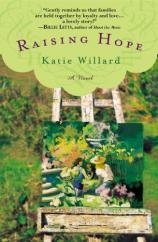Reading Group Guide
Discussion Questions
Raising Hope

1. Start off with the title of this extraordinary first novel, Raising Hope-what do you make of its meaning? Who needed hope, or Hope, and why?
2. A central focus of this novel is the relationship between Sara Lynn and Ruth. Is it a friendship? Is it equal? Does it change during the novel? Trace it back to their childhood: what attracted them to each other and what kept them apart?
3. Although Bobby Teller is missing, physically, in the lives of three of the four main characters, he's very much present. Is he basically a good guy or a bad boy? Why did he give Hope to both Ruth and Sara Lynn? Do you think he was being exceptionally wise or just wanted out of a situation? Why do you think he left?
4. Do you think that if Sara Lynn had known how much Bobby had loved her that they would have stayed together? Could their relationship have worked out in the long run? Why or why not?
5. Secrets abound in Raising Hope. All four of the main characters have them. Do you think everyone in real life keeps secrets? What is the result of keeping secrets? Should you ever keep them? Were Sara Lynn and Ruth correct in keeping secrets from each other? Or right in keeping them from Hope-especially about her father? Should a parent withhold important information-keep secrets-from a child? Why or why not?
6. Discuss the mother-daughter relationship of Ruth and her mother, Mary, and Sara Lynn and her mother, Aimee. What kept the mothers and daughters apart? What brought them together?
7. Who does the best job of "mothering" in the novel-Ruth, Sara Lynn, Aimee, or Mary? Who does the worst, and why?
8. Raising Hope. depicts four people living in the same house. Are they a family? What connects people as family-kinship or love or what?
9. To what extent, do you think, can adults influence or guide relationships between children? Mary Teller and Aimee Hoffman seem to encourage Ruth and Sara Lynn to be friends, but the girls were hostile to each other. And we discover that both Ruth and Sara Lynn felt like outsiders with their peers, and now Hope is having difficulty feeling accepted. What makes a child feel different and unaccepted? Does the novel suggest any ways acceptance can be made easier for a child?
10. Ruth says early on in the novel, "No more goddamn trouble on my watch" (p. 11). And Sara Lynn thinks Ruth is like the flower, scabiosa, "The harder you cut back scabiosa, the more vigorously it blooms" (p. 32). Then there is Ruth's name: "Ruth" and "Teller." Taken all together, what is Ruth's role in the novel? Does her character have symbolic meaning?
11. What happened to change Sara Lynn so dramatically in Boston? Does she change again during the course of the novel? And while she described Ruth as scabiosa, she describes herself as "Nothing living in the garden, I think. Maybe part of the hardscape. Maybe a rock." Why?
12. The men who have affected the women in this novel basically aren't in the novel, although Sam and Jack have minor roles. How does this novel depict men? What does it seem to say about their place in women's lives?
13. Is Ridley Falls really "Any small town, USA"? Do you agree or disagree?
14. Hope doesn't fully accept Ruth and Sara Lynn as her parents. Sara Lynn says: "You don't have any of my genes in you and you have Ruth's only indirectly, but you have our stories running around in your veins. That's what makes you ours" (p. 45). Do you think that's true? Why or why not?
15. The book ends with a wedding. What do weddings symbolize? Do you think this is the best ending for the book? What are some other possible way the book could have ended?
Raising Hope
- Publication Date: May 2, 2006
- Paperback: 336 pages
- Publisher: Grand Central Publishing
- ISBN-10: 044669729X
- ISBN-13: 9780446697293







